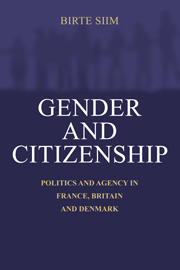Book contents
- Frontmatter
- Contents
- List of Tables and Figures
- Preface
- Abbreviations
- Introduction: Feminist Rethinking of Citizenship
- 1 Towards a Gender-sensitive Framework of Citizenship
- 2 Theories about Citizenship
- 3 Feminist Approaches to Citizenship
- 4 Gender and Citizenship: The French Case
- 5 Gender and Citizenship: The British Case
- 6 Gender and Citizenship: The Danish Case
- Conclusion: Towards a Contextualised Feminist Theory of Citizenship
- Appendix
- Notes
- Bibliography
- Index
Conclusion: Towards a Contextualised Feminist Theory of Citizenship
Published online by Cambridge University Press: 05 November 2011
- Frontmatter
- Contents
- List of Tables and Figures
- Preface
- Abbreviations
- Introduction: Feminist Rethinking of Citizenship
- 1 Towards a Gender-sensitive Framework of Citizenship
- 2 Theories about Citizenship
- 3 Feminist Approaches to Citizenship
- 4 Gender and Citizenship: The French Case
- 5 Gender and Citizenship: The British Case
- 6 Gender and Citizenship: The Danish Case
- Conclusion: Towards a Contextualised Feminist Theory of Citizenship
- Appendix
- Notes
- Bibliography
- Index
Summary
In the concluding chapter I confront feminist rethinking of citizenship with the discourses and politics of women's citizenship in different contexts and aim to develop a contextualised feminist theory of citizenship. I look first at the feminist rethinking of citizenship and discuss the different meanings of the key concepts of equality, care and participation in different contexts. The three feminist paradigms have all criticised the dominant male norm in civic republicanism, liberalism and socialism, but they have different perceptions of the potential for and limits to women's agency to influence politics. Despite the differences, one of the objectives of feminist scholarship is to develop a vision of citizenship that re-creates the link between democratic and social dimensions of citizenship, with women at the centre.
Second, I discuss the main questions concerning the interaction between discourses, institutions and agency raised by the three cases–France, Britain and Denmark. All three illustrate the importance of politics and the strength of the male norm embedded in institutions, discourses and policies as well as the attempts of women's agency to influence politics and change institutions. The French story is one of the political exclusion of women based on their sexual difference. It illustrates the contradictions of civic republicanism and the gap between male universalism and the perceived particularism of women. The British story is about gender inequality based on the roles of women as mothers and wives.
- Type
- Chapter
- Information
- Gender and CitizenshipPolitics and Agency in France, Britain and Denmark, pp. 149 - 169Publisher: Cambridge University PressPrint publication year: 2000

